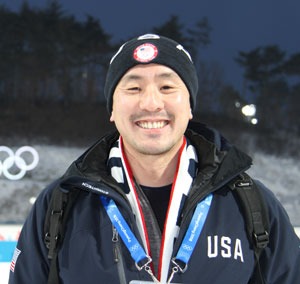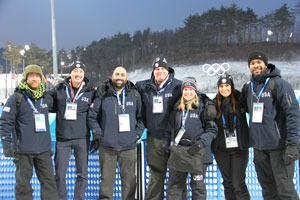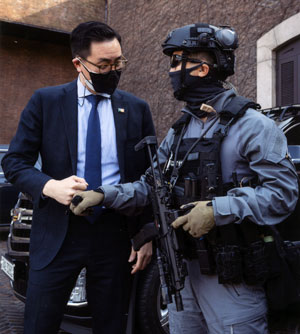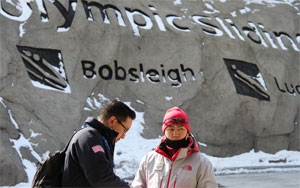
Special Agent Wonjoon Eric Song
My name is Wonjoon Eric Song, I am a special agent with the Diplomatic Security Service (DSS) of the United States Department of State. I am currently serving at the U S embassy in Seoul, South Korea, where I am servicing as the Assistant Regional Security Officer Investigator (ARSOI).
I joined the DSS in 2009. Before that, I had spent eight years in the United States Army I never really thought I would pursue a career in law enforcement. When I decided to leave the military, I knew that I still wanted to continue to serve our country, and law enforcement career seemed like it would be great choice because many of the skills and abilities that I gained from my military service would translate well into this line of work.
So during my last year in the army I applied to a few different agencies and went through their hiring process. I was very fortunate that I got hired and started with DSS just shortly after getting out from the army. It’s been about 12 years now and I’ve never looked back and even though. This career path was something that I decided on kind of last minute. It has been an incredibly rewarding and fulfilling career.
What is the Diplomatic Security Service
The DSS is the law enforcement and security bureau of the U S Department of State. One thing that makes our agency unique is the fact that DSS has the largest global reach of any us law enforcement agency, with our agents assigned to over 170 countries around the world.
As members of the foreign service, DSS special agents rotate between different postings, every two to three years, domestic and overseas, I am currently serving in Seoul, South Korea, and this is my assignment number six including posts in Iraq and Paraguay.
As a DSS, special agent, we mainly do one of three jobs or a combination of these three. Protection of foreign dignitaries and the secretary of state, criminal investigations, and management of security programs at our embassies and consulates throughout the world to protect personnel facility and information. We protect, investigate and secure.
The mission of the ARSOI program is to protect the integrity of our travel documents like visas and passports and disrupt criminal and terrorist mobility by combating the production and use fraudulent travel documents. To advance this mission we perform three supporting functions; investigation, liaison and training. Currently there are 133 ARSOI’s assigned to 85 countries around the world conducting criminal investigation to root out visa and passport fraud crimes where they take place rather than waiting for them to cross us borders. Before the ARSOI program existed, fraudulent visa brokers, and document vendors overseas, as well as the visa applicants utilizing their services, had nothing to fear if they are caught. Their visa would be denied, but there were really no other consequences because there was nobody going after them. But now because of our aggressive investigative efforts targeting these vendors and brokers, as well as applicants, they face the real possibility of being prosecuted.
Despite what people might see in movies, as U.S federal law enforcement officers operating overseas, we do not have the authority to go out on our own and chase down criminals in foreign countries. We need to rely on our host nation partners and gain their cooperation to be able to do all that. So that is why in addition to conducting investigations, a big part of our job is to forge partnerships and maintain good working relationships so that when we need their help, our host nation partners are willing to do that and provide assistance. I am very fortunate to be in Korea because the Koreans have been super reliable and committed partners, and they believe in pursuing a joint effort to combat transnational crimes together. They represent the trifecta of what we’re looking for in a successful law enforcement partnership Because they have the skills and ability to conduct investigations, have the tools and equipment they need, and they have the desire to go after the bad guys.
Visa and Passport Fraud
When it comes to visa and passport fraud, South Korea is a low fraud country and that is great. Across the board, an overwhelming majority of South Korean Nationals travel to the U.S. in accordance with our immigration laws. This is not to say that fraudulent activities do not take place here in Korea, because they certainly do. But this is a place where fraud is savvy which makes my job a little bit more difficult because I really have to look beneath the surface and try to anticipate where criminals will try to take advantage of an exploit our immigration system.

Last year we came across a few visa cases that had some minor discrepancies, but we noticed some commonalities among these cases. So we decided to look into it and by digging a little bit deeper and connecting some dots, we found a network of these applicants who obtained their visa through a major fraud scheme orchestrated by a local travel agency.
The travel agency was actually just down the street from the embassy. This travel agency was assisting Korean nationals with filling out their online applications which is totally fine. But this case, the travel agency provided fabricated employment information to raise the applicant’s qualifications or status to increase their chances of getting their visas approved.
In some cases, the travel agency even provided false employment documents for applicants to present during their interviews. These Korean nationals were supposed to come to the United States and work at these companies, but those companies didn’t even exist. After we discovered this fraud scheme, we collaborated with our visa team and we continued to let these applicants come in for their interviews because this allowed us to collect additional evidence and build a case against the visa broker.
We coordinated with our Korean police partners who opened a separate investigation on their end. Using the information. we were able to share with them at the time, they obtained search warrants for the office, email accounts, bank accounts, and subsequently arrest warrants. In the end, we shut down that local travel agency, arrested the owner, and his associates.
We revoked a large number of visas that have been obtained through the scheme and we didn’t stop there because we knew that some of the folks had already traveled to the U S on these visas. So we worked with our U S interagency partners, mainly the US Department of Homeland Security, to make sure that they’re not able to extend their stay in the US or change their immigration status to something more permanent.
I believe a lot of these visa brokers and travel agencies are sometimes supporting these larger criminal enterprises. Some of these actors are associated with other crimes as well. A lot of human traffickers are involved in prostitution rings in the United States and they try to get a visa through these are fraudulent brokers and travel agencies.
Providing Security to International Events
At DSS we provide a security support for major international such as the Olympics, the World Cup, and many other major events. While the primary security responsibility is with the host nation, DSS augments the host nation security efforts and helps ensure the safety and security of us interests.

When we arrived in Korea, we got assigned to many of the sporting venues like the ski jumps, snowboard, ice skating. Because of the language skill that I had, I was assigned to the Olympic headquarters to work inside the host nation security office. It was really impressive to see their setup. They had hundreds of monitors in the room receiving security feeds from thousands of cameras all over the venue. They were being monitored 24/7. Whenever an incident came up, my job was to get detailed information from our counterparts and then relay that information to our joint operation center that we set up at the US Embassy. I would also relay information from our joint operation center to the host nation security office. Whenever any problem arose, me and my partner would head out there and to resolve that issue, anything that involved our athletes or any US interest.
That was really cool, one of those, “man, I can’t believe I’m getting paid for this” type of moments because I had front row seats to the Olympic events and witnesses our athletes winning gold medals. One day I was helping out at the snowboarding competition and was literally right there to see Sean White and Cloe Kim win their gold medals.
Skills to be a Successful DSS Security Agent
There are many skills and abilities to be successful as a DSS agent. In my opinion, interpersonal skills and adaptability are the top two most important skills. As a DSS special agent, we’re working overseas most of the time. Throughout our career and when we’re operating overseas, whether running a protection detail of our Secretary of State, or whether we’re conducting an investigation or managing security programs at the embassy to protect our personnel facility or information, we need to rely heavily on our host nation partners.
And in order to do that, you’ve got to expand and build contacts and foster and maintain relationships to build strong partnerships, and all of which require good interpersonal skills. Even within the embassy where we work, we have to maintain really good relationships with different offices within the State Department.
Tips for Pursuing a Law Enforcement Career
You’ve got to want to serve others, the community, and our country. If you are pursuing this career simply for yourself or just because it’s a good job or simply driven by your self-interest only without having some sense of public service, it will be difficult to have a truly fulfilling career in law enforcement.

Try not to put all your eggs in one basket. There might be just one agency that you are really interested in. But, I suggest that you broaden your search and take a look at other agencies and apply to those as well. It’s good to get your foot in the door and build your experience as a law enforcement officer, even if you later decide to transfer to another agency.
Lastly, I would encourage you to check out recruitment events. I recognize these may not be available everywhere, but personally, it helped me tremendously when I was applying for this job. There was a recruiting event at a nearby university that was two hours away, but I did the drive and it was worth it because I had an opportunity to speak with two DSS agents and they provided some really valuable insights about the job hiring process and training, and that really set me up for success.
I am finishing up my assignment here in Seoul pretty soon, and it’s been a great privilege to serve in Korea. This particularly has been a special tour for me being a first generation Korean American. I was born and raised right here in Seoul before moving to the United States when I was 15 years old. From where I live now, I can see my old high rise apartment that grew up in. On top of that, where I work now at the US Embassy in the Consular Section is exactly where my parents came to receive our immigrant visa 27 years ago.
So when I reflect on all this, I think “wow,” things have come full circle and it’s pretty wild that I am right back at where it all started for me. It’s a pretty cool story, but the fact is that stories like mine are pretty common in our agency DSS.
And in the state department, I met numerous people with similar stories. Throughout my career. And I really I have to say, I appreciate that about our organization. I think it speaks to what a diverse workforce that we’re part of. And I’m really proud of that.

 Joseph Libowsky,
Joseph Libowsky,